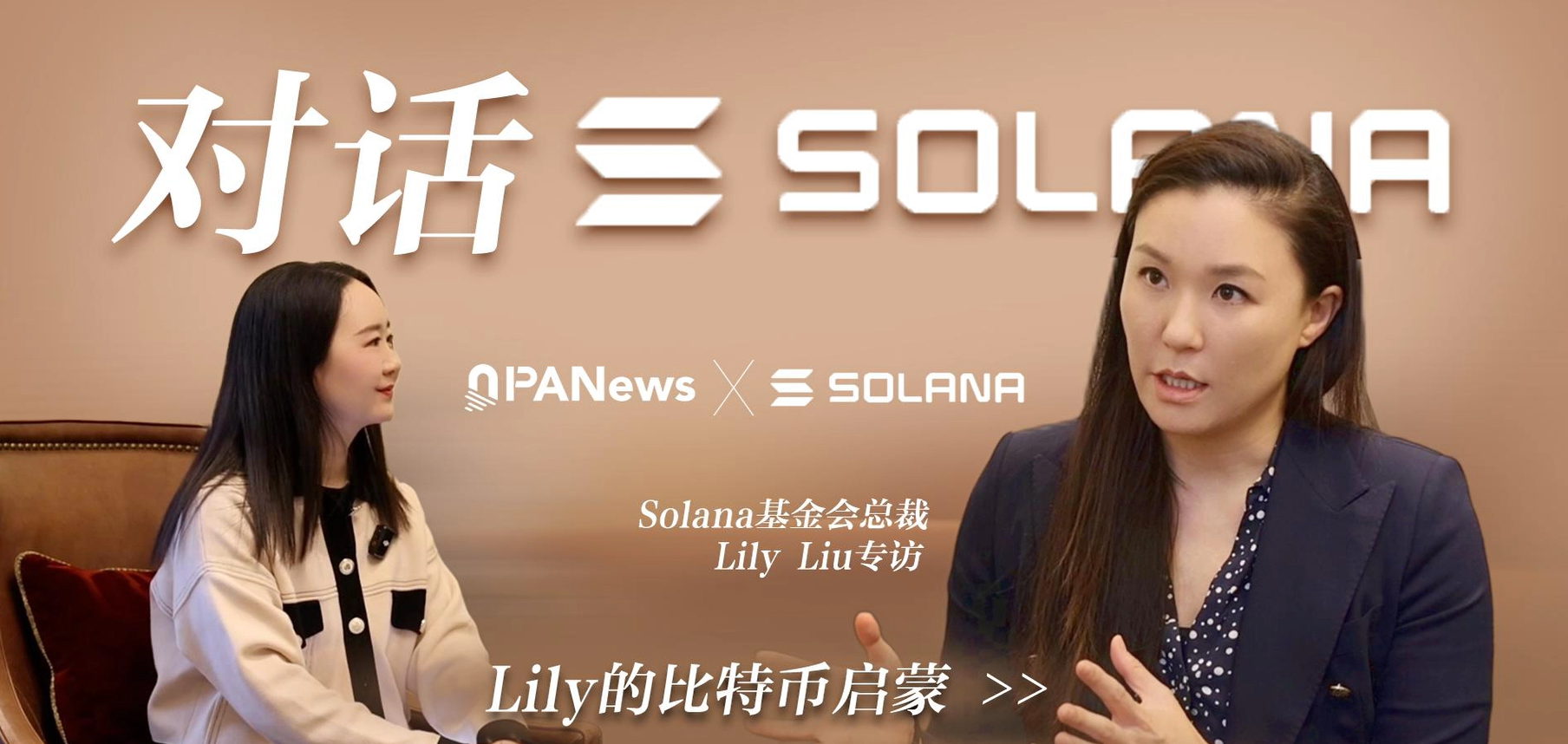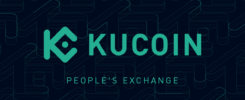Interview by Tong, PANews
Edited by: Yuliya, PANews
Eleven years ago, Shanghai became the first stop for Lily Liu, Chair of the Solana Foundation, as she entered the world of crypto. Eleven years later, she returns with a deep understanding of and strong commitment to the Chinese-speaking market.
In this PANews interview, Lily Liu shared her understanding of the underlying logic of blockchain, the development of the Internet, and the PayFi concept. She explained why Solana has increased its investment in the Chinese-speaking region since 2023, and how Solana is building open financial infrastructure globally and promoting developer ecosystem and digital asset innovation.
A non-technical background, starting his crypto enlightenment in Shanghai
PANews: In your speech at Wanxiang, you mentioned your deep connection with Shanghai. Eleven years ago, you worked in Shanghai, and it was there that you first encountered the crypto world. Could you tell us about that time?
Lily Liu: That was in 2013. My good friend Bobby Lee founded BTCC, one of the earliest Bitcoin exchanges in China. We were alumni and had known each other since 2012. One day, while we were playing poker, he suddenly started talking to me about Bitcoin and gave a speech in Shanghai, almost preaching about Bitcoin as a “religion.” At the time, I was quite curious, but also a little skeptical, wondering if Bitcoin was some kind of “money laundering tool” or some kind of informal technology.
Bobby encouraged me to read the Bitcoin white paper. I read it several times and found that although it’s not long, it proposes a very innovative technical architecture. Although I don’t have a technical background, I can see that this is a real breakthrough, not just a “tool for playing with money,” but a new direction brought about by the combination of economics and technology.
The white paper was titled “Peer-to-Peer Electronic Cash,” a concept I found very interesting at the time. It essentially proposed a new phase of the internet. Looking back at the development of the internet, we have gone through two phases: the information internet and the mobile internet, while Web3 is the “internet of assets.”
Looking back at the history of the internet, there’s an uncommon status code in the HTTP protocol called “402 Payment Required,” which evoked the idea of native internet payments as early as 30 years ago. However, at that time, the technology wasn’t mature enough, and people couldn’t retain value in the electronic world.
The fundamental innovation of blockchain is establishing a trusted ledger on the internet. Since the birth of Bitcoin in 2008, this innovation has developed into a complete economic system. And all my understanding of the crypto world began in Shanghai.
Increase efforts to develop the Chinese-speaking region and be optimistic about its payment potential.
PANews: Your Chinese was noticeably more fluent during your exchange in Shanghai this time than it was in Hong Kong two years ago. Is this because you spent a lot of time in Chinese-speaking regions over the past two years?
Lily Liu: Yes. I’ve lived in Beijing and Shanghai before. Improving your language skills definitely requires an environment. Opportunities were limited in the past few years, but since 2023, I’ve started focusing on the Chinese-speaking market.
The Chinese-speaking region is highly active and strong in terms of developers, innovation, and capital. Solana aims to build deep connections with this community and drive ecosystem growth. Since 2023, we have launched developer training, community building, incubation support, and investment programs to encourage developers in the Chinese-speaking region to participate in the Solana ecosystem and explore the potential of SVM. These efforts are establishing a solid technical and talent foundation for Solana in the Chinese-speaking region.
PANews: I know that Solana holds various developer events around the world, including in Europe, India, and the United States. Based on your observations of different countries, what unique advantages do you see Chinese developers have compared to developers from other countries?
Lily Liu: “Fast-paced” is the most obvious characteristic. Whether it’s development speed or execution, developers in the Chinese-speaking region are arguably among the world’s best. Looking at the entire technology industry, there are very few places that possess both depth and breadth in their talent pool, and the Chinese-speaking region is one of them.
Solana is essentially an open-source technology platform. We often joke that the Solana Foundation is like a “human interface” to GitHub Repo; the foundation’s role is to speak for open-source code, because the code itself cannot speak. We attract developers, capital, and partners to build the “city” of Solana together.
Blockchain is like a new piece of land, and building an ecosystem is like constructing a city on that land. Developers and application founders are the city builders. Building an ecosystem can be simply divided into three layers: the bottom layer is the network, the middle layer is applications, and the top layer is assets. This order is crucial; if the network is unhealthy or unstable, the applications and asset markets above it cannot sustain themselves.
The internet has been open for 30 years, allowing anyone to connect and access information. With the addition of blockchain, the internet carries not only information but also an open network of assets. I’ve always felt this is a very interesting and ambitious direction that can make international finance more equitable.
PANews: You also mentioned that Chinese developers have strong execution capabilities, but from a global perspective, in what areas do they still need to improve?
Lily Liu: China leads the world in experience and talent in the payment field. Over the past decade, the Super App that achieved the biggest breakthrough on mobile devices globally was made in China, seamlessly integrating social interaction and payments into a unique experience that is almost unheard of elsewhere. Therefore, if overseas companies want to find top talent who truly understand payment systems, user experience, and infrastructure, the Chinese-speaking region is undoubtedly the first choice.
PayFi is not just about payments; it’s about building an open financial infrastructure.
PANews: You mentioned payments, and I remember you’ve been heavily promoting the PayFi concept.
Lily Liu: Yes, I didn’t expect this concept to get so much attention at first. I started talking about this concept last year because one day I suddenly had an idea: payment is not just about sending a coin from point A to point B; the potential of blockchain goes far beyond that.
We should all thank Ethereum for its vision, which has brought breakthroughs to the entire industry, showing us that blockchain is more than just “transferring value.” If blockchain can have native smart contracts, it becomes a development platform, an app platform, which greatly expands the scope of blockchain applications, making it possible for any app to exist on the blockchain.
So why did I mention “PayFi” instead of “Payments”? Because “PayFi” is built on top of the most basic ability of payments, and adds all the DeFi applications that smart contracts can create.
This means that users can access a vast world covering all usage scenarios with just one wallet. Our long-emphasized “Internet Capital Markets” envisions this: there should be an asset internet on the internet. This asset internet is not a single application; it must be open-source, open, and neutral financial infrastructure to bring together the widest range of buyers and sellers, forming a massive market.
Ultimately, it can integrate all asset classes and use cases, allowing anyone with internet access to complete both payments and transactions within a single wallet. We are facing a massive market of 5.5 billion people online.
PANews: Besides PayFi, Solana has also heavily promoted tracks like DePIN. So, what other tracks do you particularly favor, or hope to actively encourage developers to enter?
Lily Liu: If Amazon is the “Everything Store”, then Solana is the “Everything Chain”.
We don’t specifically differentiate between different sectors. My view is that a blockchain itself serves as a financial infrastructure, and this infrastructure can serve all sectors. Because regardless of the sector, as long as a project has an initial token, it needs liquidity and trading, and essentially requires a universal financial infrastructure. A token is digital value; its nature and the project it belongs to are separate from the underlying technology.
Therefore, whether it’s hardware-related DePIN, pure finance, or other digital assets, we can support them as an infrastructure, and we remain neutral to all assets and developers.
Tokenization is driving a shift in traditional perceptions, but development and user experience still need improvement.
PANews: You also mentioned that there are currently six or seven digital asset treasury (DAT) companies in the Solana ecosystem. Will you support all of these companies, or will you conduct a selection process? What are the criteria for selection?
Lily Liu: These companies are all independently decision-making teams with the goal of becoming core developer teams. Our foundation has always supported builders of the entire ecosystem. In the past, our definition of “builder” was more focused on early project founders. But I believe that these emerging companies also belong to our community as builders; they are a new type of ecosystem contributor, just in a different sense from the early startup teams.
Our role is to support the ecosystem. We support anyone contributing to Solana, whether they are businesses or individual developers. They have different needs, but as long as they contribute to Solana, we will support them. In the past year or two, Wall Street’s understanding, acceptance, and even support for blockchain have changed rapidly. We believe these DAT companies have the potential to become long-term, important ecosystem players, and therefore we have established partnerships with them.
PANews: As you and these companies have increased your interactions with traditional institutions, have you noticed that their attitudes toward Crypto, or specifically Solana, are gradually improving?
Lily Liu: I think that in the past one to two years, the attitudes of various regions, countries, and regulatory authorities have improved significantly. I believe the core driver of this improvement is “tokenization.” This trend actually started in 2018, but like many new technologies, it was accompanied by bubbles in its early stages. Only after several rounds of market testing did it truly develop steadily and become a sustainable direction.
This is similar to Gartner’s Hype Cycle, which is quite common. So, while some criticize blockchain development as slow, I actually think it’s developing very quickly, depending on your perspective. Because blockchain isn’t an application; it’s a network, a more underlying infrastructure. A more suitable benchmark for Solana isn’t a company like Google, but rather foundational protocols like TCP/IP, Linux, or HTTP.
PANews: As you said, the infrastructure is improving and applications are being built, which may explain why people feel that new user growth isn’t fast enough. From your perspective, what are some ways to attract more users to Web3 and Solana?
Lily Liu: Solana currently has about 80 million monthly active users globally, which is among the top in the industry. However, to attract more users, we first need to improve two aspects: the developer experience and the user experience. There is still a lot of room for improvement in both of these areas.
As a foundation, our primary beneficiaries are developers. We’ve always been thinking about how to make the developer experience simpler and easier. For example, the Anchor framework came along a few years ago, and now there are many different developer tools, all of which we support.
Regarding user and enterprise experience, we are exploring possibilities such as creating a simple API that allows any Web2 application to become a Web3 “super app” through integration. This would allow “any app to become a super app.” We are also considering how to make integrating Solana and Web3 easier.
PANews: Finally, I’d like to ask you personally, as a female professional, you’ve been traveling around the world a lot lately, and your child has started elementary school. How do you balance your demanding work life with your family life?
Lily Liu: Actually, I only do two things right now: work and family. If you include taking care of myself, it’s three. I think in the long run, family is definitely the most important. But I don’t think my work and family are in conflict. By using my abilities, I’m also setting a good example for my children.
Especially since I have two daughters, I want them to see what their mother can achieve, rather than feeling that they are limited by being a woman. I am very grateful for the education my mother gave me. She never told me, “Because you are a woman, there are different expectations or a different future for you.” She told me from a young age that I have the same resources and the same opportunities, and even more resources and opportunities because I was the youngest in the family and could learn from my older brothers and sisters.





